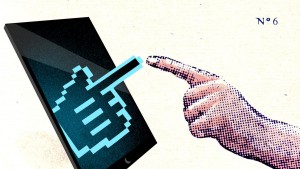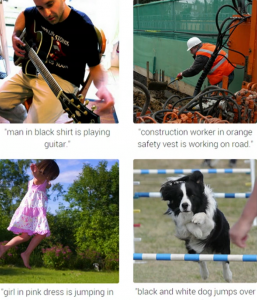 This is a big question with a multitude of answers. NPR’s new program/podcast Invisibilia answers with three stories. The first one looks at the big picture with questions about artificial intelligence, wearable computers, and the possibilities for human/computer co-evolution. The other two stories look at specific, personal, right-now examples of human character changes as a result of digital technology.
This is a big question with a multitude of answers. NPR’s new program/podcast Invisibilia answers with three stories. The first one looks at the big picture with questions about artificial intelligence, wearable computers, and the possibilities for human/computer co-evolution. The other two stories look at specific, personal, right-now examples of human character changes as a result of digital technology.
npr.org/programs/invisibilia/385792677/our-computers-ourselves
Category: 15.5 Question-Answering Machines
 For decades researchers have experimented with machine learning—software that can improve with experience without being reprogrammed. That research has paid off in a number of applications, including the intelligent search engines that we use every day. But recent breakthroughs in a field called deep learning are likely to bring radical transformations to our lives very soon. This TED Talk by Jeremy Howard explains the technology and touches on a few applications and implications. Spoiler: there’s good news and bad news….
For decades researchers have experimented with machine learning—software that can improve with experience without being reprogrammed. That research has paid off in a number of applications, including the intelligent search engines that we use every day. But recent breakthroughs in a field called deep learning are likely to bring radical transformations to our lives very soon. This TED Talk by Jeremy Howard explains the technology and touches on a few applications and implications. Spoiler: there’s good news and bad news….
[ted id=2155 lang=en]
 When Apple released the iPhone, the world changed. People were carrying powerful computers in their pockets and purses. Developers released a bevy of creative apps to harness that always-available computing power. Today it’s hard to imagine a world without smart phones. Could Google Glass, the wear-on-your-face computer from Google, be the beginning of the next revolution in personal computing? This short NPR story explains how early adopters plan to use their prototype high-tech specs.
When Apple released the iPhone, the world changed. People were carrying powerful computers in their pockets and purses. Developers released a bevy of creative apps to harness that always-available computing power. Today it’s hard to imagine a world without smart phones. Could Google Glass, the wear-on-your-face computer from Google, be the beginning of the next revolution in personal computing? This short NPR story explains how early adopters plan to use their prototype high-tech specs.
npr.org/blogs/alltechconsidered/2013/04/17/177557810/Seeing-The-World-Through-Google-Colored-Glasses
Of course, not everyone views Google Glass through such rose-colored lenses. This Saturday Night Live skit mocks the idea that Google Glass can be used discreetly; other detractors question our need to become even more dependent on our technology.
mashable.com/2013/05/05/snl-google-glass-parody/
What’s it like to be the world Jeopardy champion and lose to a computer? Ken Jennings can tell you, and he does in this engaging TED talk. From his unique perspective, he suggests that we can—and must—make a choice about the kind of future we want to have. Which world do you want to live in?
More about Watson:
IBM’s Watson, the famous artificial-intelligence system that became a quiz show champ, is now poised to transform the fields of medicine, finance, education, and more. In some ways Watson is an industrial-strength version of Siri, the personal assistant built into iPhones. Is Watson leading us into a whole new era of cognitive computing? This fascinating Fast Company article puts Watson in the context of today’s data-driven world and speculates on a future that’s much bigger than talking smart phones.
fastcompany.com/3001739/ibms-watson-learning-its-way-saving-lives
Many of our biggest technological breakthroughs have their roots in science fiction. This Wired piece, and the book that inspired it, explores the SciFi/Tech link with several real-world examples. What futuristic ideas are likely to graduate into everyday tech over the next decade?
Here’s a quote from the first edition of Digital Planet (then called Computer Currents), written almost two decades ago:
“It seems likely that, at some time in the future, machines will be able to do most of the jobs people do today. We may face a future of jobless growth–a time when productivity increases, not because of the work people do but because of the work of machines. If productivity isn’t tied to employment, we’ll have to ask some hard questions about our political, economic, and social system…”
Back then, this prediction seemed farfetched to most people. This NPR story about the Race Against the Machine conference suggests it’s not farfetched anymore.
www.npr.org/2011/11/03/141949820/how-technology-is-eliminating-higher-skill-jobs
This year Watson, an IBM computer, beat two champions on TV’s Jeopardy. This PBS Nova program goes behind the scenes and explains how Watson’s creators pulled it off.
Conversations with Robots
Be careful–you may be falling in love with a software robot. This episode of Radiolab—NPR’s clever and entertaining broadcast/podcast—explores many ways people talk to machines, including those alluring bots that populate online dating sites. Eliza, Furbie, Clever Bot, Bina—they’re all talking to us, and we’re listening. Radiolab puts it all in perspective in this fascinating program.